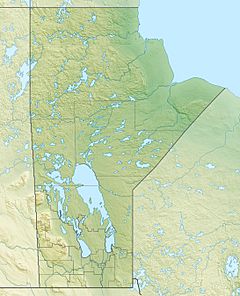Deer River (Manitoba) facts for kids
Quick facts for kids Deer River |
|
|---|---|
|
Location of the mouth of the river in Manitoba
|
|
| Country | Canada |
| Province | Manitoba |
| Region | Northern |
| Census division | 23 |
| Physical characteristics | |
| Main source | Unnamed lake 226 m (741 ft) 57°35′00″N 95°14′24″W / 57.58344429612829°N 95.24001072099297°W |
| River mouth | Dog River 25 m (82 ft) 58°22′40″N 94°13′02″W / 58.37778°N 94.21722°W |
| Basin features | |
| River system | Hudson Bay drainage basin |
The Deer River is a river located in the northern part of Manitoba, Canada. It flows through a region called Census Division 23. This river is part of the huge Hudson Bay drainage basin, which means its waters eventually flow into Hudson Bay. The Deer River is a smaller stream that flows into the Dog River.
Where Does the Deer River Flow?
The Deer River starts from a lake that doesn't have a name. This lake is about 6 kilometers (about 3.7 miles) east of the much larger Churchill River.
From its source, the Deer River flows towards the east. It passes through several lakes, which are known as the Deer Lakes. As it continues its journey, the river moves further away from the Churchill River, reaching a distance of about 70 kilometers (about 43 miles).
After flowing east for a while, the Deer River turns and heads north. For the rest of its path, it flows roughly alongside the Hudson Bay Railway. This railway line has small stops like M'Clintock, Chesnaye, and Lamprey.
The Deer River finally reaches its end when it flows into the Dog River. This meeting point is just before the Dog River itself joins the Churchill River. The Churchill River then carries all these waters north to Hudson Bay.
Smaller Streams Joining the River
Rivers often have smaller streams that flow into them. These are called tributaries. The Deer River also has a few of these:
- Lost Moose Creek (joins from the right side)
- Clifford Smith Creek (joins from the left side)
- Robert Thomson Creek (joins from the left side)


